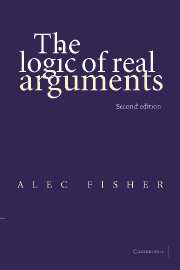Book contents
- Frontmatter
- Contents
- Preface to the first edition
- Preface to the second edition
- Acknowledgements
- 1 Introduction
- 2 A general method of argument analysis
- 3 A first example – from Thomas Malthus
- 4 Reasoning about nuclear deterrence
- 5 An example from John Stuart Mill
- 6 Arguments about God's existence
- 7 How do your mind and body interact?
- 8 Suppose for the sake of argument that …
- 9 An example from Karl Marx
- 10 Evaluating ‘scientific’ arguments. Some initial examples
- 11 Philosophical assumptions
- Appendix: Elementary formal logic
- Exercises
- Bibliography
- List of further reading
- Index
5 - An example from John Stuart Mill
Published online by Cambridge University Press: 05 June 2012
- Frontmatter
- Contents
- Preface to the first edition
- Preface to the second edition
- Acknowledgements
- 1 Introduction
- 2 A general method of argument analysis
- 3 A first example – from Thomas Malthus
- 4 Reasoning about nuclear deterrence
- 5 An example from John Stuart Mill
- 6 Arguments about God's existence
- 7 How do your mind and body interact?
- 8 Suppose for the sake of argument that …
- 9 An example from Karl Marx
- 10 Evaluating ‘scientific’ arguments. Some initial examples
- 11 Philosophical assumptions
- Appendix: Elementary formal logic
- Exercises
- Bibliography
- List of further reading
- Index
Summary
My father never permitted anything which I learnt to degenerate into a mere exercise of memory. He strove to make the understanding not only go along with every step of the teaching, but if possible, precede it. Anything which could be found out by thinking, I was never told, until I had exhausted my efforts to find out for myself.
J. S. Mill, Autobiography, Chapter 2In this chapter we consider a classic ‘nugget’ of an argument due to John Stuart Mill (1806–75). It comes from his Principles of Political Economy which was first published in 1848 and which ran to seven editions in his own lifetime.
James Mill, John Stuart Mill's father, and his friend Jeremy Bentham founded and promulgated the philosophy of ‘utilitarianism’ which was based on the doctrine that actions are good in so far as they ‘promote the greatest happiness of the greatest number’. James Mill was a highly educated man in many spheres and he took sole charge of his son's education from the beginning. He began to teach his son Greek at the age of three. They sat at the same table at which his father worked and, since there were no such things as English-Greek dictionaries,
I was forced to have recourse to him for the meaning of every word which I did not know. This incessant interruption he, one of the most impatient of men, submitted to, and wrote under that interruption several volumes of his History and all else that he had to write in those years.
(Autobiography, Chapter 2)- Type
- Chapter
- Information
- The Logic of Real Arguments , pp. 70 - 81Publisher: Cambridge University PressPrint publication year: 2004



